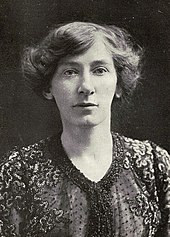The March of Women
The March of the Women is the title of the song that was the anthem of the English women's movement . The music comes from the English composer Ethel Smyth . The song was composed in 1910 and performed for the first time on January 21, 1911 at a ceremony at Pall Mall in London and again at an event on women's suffrage on March 23, 1911 at the Royal Albert Hall . It then spread rapidly across England . "It is at once a hymn and a call to battle" (quote from a journalist in Votes for Women magazine ).
Probably the most famous performance of this song took place after numerous British women's 1,912 in London's prison Holloway were detained. The British conductor Thomas Beecham , who visited the composer Smyth in prison, reported on this performance:
- I arrived in the prison yard and found the noble group of martyrs marching up and down there and singing their war song “March of the Women” with heart's content, while the composer looked benevolently from one of the upper windows and with bacchanalian energy Beat with a toothbrush .
The music of the “March of the Women” is based on a folk song theme from Abruzzo that Ethel Smyth heard while on vacation there and to which the actress, poet, journalist and suffragette Cicely Hamilton (1872–1952) only wrote the text after the composition underlaid.
Individual evidence
- ↑ See Collis, Louise: Impetuous Heart. The story of Ethel Smyth . London: William Kimber 1984, pp. 104ff. ISBN 0-7183-0543-4 .
- ↑ "I arrived in the main courtyard of the prison to find the noble company of martyrs marching round it and singing lustily their war-chant while the composer, beaming approval from an overlooking upper window, beat time in almost Bacchic frenzy with a toothbrush. " See Beecham, Thomas: Dame Ethel Smyth (1858–1944) . The Musical Times 99 (1385/1958): pp. 363-365. JSTOR 936486 , as of June 29, 2015, and Beecham, Thomas: A Mingled Chime (1943/44). Reprinted by Hutchinson 1979, pp. 138f. Online edition .
- ↑ Cf. Collis, Louise, pp. 104f.
- ^ Text printed in: Ethel Smyth . Conductor: Philip Brunelle. The Plymouth Music Series. Audio CD with a detailed booklet. Virgin 1991. [1] .


